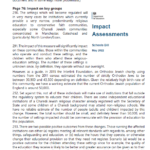Gilyonos for Shabbos attached |
| Advert |
 |
|
|
| Community News |
| Succahs banned in Stamford Hill housing block built to accommodate Charedi Jews |
 |
|
New rules: the Tower Court apartment complex in Hackney, with balconies designed for succahs (Photo: Google Maps) |
|
According to the Jewish Chronicle Residents of Stamford Hill’s Jewish community are outraged after being told by Hackney council that they are no longer allowed to build succahs on their balconies, leaving them in limbo just days before Succot begins. The Tower Court apartment complex, which was completed last year, was built with special features to accommodate the local community, including balconies with an unobstructed view of the sky, designed for succahs.. But last month, citing new requirements in the Building Safety and Fire Safety legislation, Hackney council informed residents that succahs on balconies were a fire hazard and posed a “significant level of risk to [the] lives of residents” and therefore would not be permitted. A resident of the complex, who wished to remain anonymous, told the JC: “In the name of safety, Hackney council is backtracking and creating so much burden and worry and has not given the community enough time to find a suitable compromise.” Following an inspection on August 25 by Hackney council’s House Service, a new site for communal succahs was recommended — four parking spaces near the rear end of the ground-floor car park. But this, residents say, would not be large enough to accommodate all the families. Approximately half of the occupants of the 132-flat complex are Orthodox Jews. The resident said: “[The council] appears to be generous by suggesting families make the succah [in the car park], but they are demonstrating their cultural insensitivity. “Besides the fact that the area is not enclosed in an eruv, which makes bringing food out to the area impossible on Shabbos, they cannot expect large families with many young children or disabled and elderly people to go down five floors or more every time they want to drink a sip of water.” Residents instead offered to use fireproof materials to construct the balcony tabernacles, which is common practice in boroughs such as Barnet, but after initially receiving unofficial approval from council inspectors, this too was rejected after residents waited three weeks for a response. “We moved into this building very happily because it fits our needs unlike anywhere else in England, but now we feel we are being treated very unfairly. Succot should be a time of joy for us, but now there is friction and heartache,” the resident said. A spokesperson for Hackney council said that succah balconies were “considered as part of the new Tower Court scheme at design stage. However, since planning permission was granted for Tower Court, the tragedy at Grenfell Tower occurred and fire safety regulations were consequently reviewed and changed. “This includes implementation of a new set of fire safety and building safety legislation.” They added: “We are looking to work with the local community to see whether there is a way to allow succahs to be built on balconies in future without exposing residents to unacceptable levels of fire risk.” (JC.com) |
|
|
| World News |
| Russia Launches Big Wave of Drone Strikes on Ukraine |
 |
|
Russia carried out a big wave of airstrikes on three Ukrainian regions early on Thursday in which Ukrainian officials said some attack drones had hit their targets but did not say what was damaged. Ukrainian air defenses shot down 34 of 44 incoming “Shahed” drones, the air force said. The strikes targeted the regions of Mykolaiv and Odesa in the south and Kirovohrad in central Ukraine, the military said. “We had an extremely difficult night,” Andriy Raikovych, Kirovohrad’s governor, wrote on social media. “Some of the Shaheds over the region were destroyed. However, there were also hits.” There were no casualties and no damage to civilian infrastructure, he said. There were no reports of significant damage in Mykolaiv. The Odesa region’s governor, Oleh Kiper, praised the region’s air defenses after the latest wave of Russian attacks since Moscow’s full-scale invasion over 19 months ago. “No hits or destruction. There were no casualties. There were only a few small fires on dry grass as a result of the falling wreckage of a downed Shahed,” he said. Forty-four is the largest number of drones Russia used for a single attack this month, official data showed. “Fighter aircraft, anti-aircraft missile units and mobile fire groups were engaged to repel the attack,” the military said. Russia conducts regular long-range missile and drone attacks on targets in Ukraine, with recent attacks often targeting grain and port facilities and officials warning that Russia will attack energy infrastructure during the bitter cold of winter. Kyiv, which has launched a counteroffensive against Russia’s occupying forces, has been discussing with allies how to beef up its air defenses. Those discussions included talks in Kyiv between President Volodymyr Zelensky and Britain’s new defense minister, Grant Shapps. In an earlier statement, the governor of the Mykolaiv region said a Russian missile hit an unnamed infrastructure facility late on Wednesday on the outskirts of the city, but that the fire that broke out there was promptly extinguished. |
|
|
| Israel News |
| Gallant Warns of Possible Heightened Strikes on Gaza Amid Protests |
 |
|
Defense Minister Yoav Gallant issued a firm warning on Wednesday during a commemorative ceremony marking the 50th anniversary of the Yom Kippur War. He cautioned that Israel would not hesitate to increase its military operations in Gaza should Israeli citizens or soldiers come under attack. Gallant emphasized that while Israel does not seek escalation or war, it is fully prepared to use its military capabilities to ensure security and restore peace in the region if necessary. He referenced Operation Shield and Arrow as a testament to Israel’s commitment to maintaining its security. Presently, the Gaza border area has witnessed ongoing unrest, although there have been no significant incidents involving live ammunition reported recently, which marks a departure from previous days. Two fires in the Eshkol regional council were attributed to incendiary balloons. Reports from Kan News suggest that Hamas may have orchestrated these border confrontations primarily for financial reasons rather than ideological motives. It is alleged that Hamas has requested increased subsidies from Qatar to cover the salaries of civil servants in Gaza. Additionally, Hamas is seeking an increase in the number of laborers permitted to travel from Gaza to Israel, from the current 17,500 to 20,000. Gallant also touched on the ongoing negotiations for normalization with Saudi Arabia, viewing them as a “glimmer of optimism” despite the challenges. He noted that Saudi Arabia’s steps toward normalizing relations with Israel, with the support of the United States, have the potential to reshape the regional landscape. This could open opportunities for resolving longstanding conflicts in the Arab-Israeli arena and foster normalization with other Muslim nations. |
|
|
| Israel and Germany Advance Arrow 3 Defense System Deal |
 |
|
Israel and Germany on Thursday took a significant step forward in their defense partnership, signing a letter of commitment to proceed with delivering the Arrow 3 air defense system to Germany. The deal, signed by representatives of both Defense Ministries, unlocks €560 million in funds approved by the German Parliament earlier this year. This funding will enable Israel to initiate production of the three Arrow 3 batteries slated for delivery to Germany by 2030. While the exact number of batteries remains unconfirmed, the agreement represents a milestone in defense cooperation between the two nations. Defense Minister Yoav Gallant lauded the signed agreement as a “major achievement for the defense industry.” Gallant and his German counterpart Boris Pistorius, present at the signing ceremony in Berlin, also reinforced their countries’ commitment to defense collaboration. The comprehensive deal is expected to reach nearly €4 billion, constituting Israel’s largest-ever single defense contract. A separate contract will be finalized to conclude the Arrow deal, contingent on approval by the German Parliament, which is expected in October. The Arrow 3 system, developed to intercept space-borne threats like ballistic missiles, warheads, and satellites, received approval from the United States in August. It is anticipated to play a role in the European Sky Shield Initiative, led by Germany, aimed at bolstering continental Europe’s air defenses in response to Russian military actions in Ukraine |
|
|










